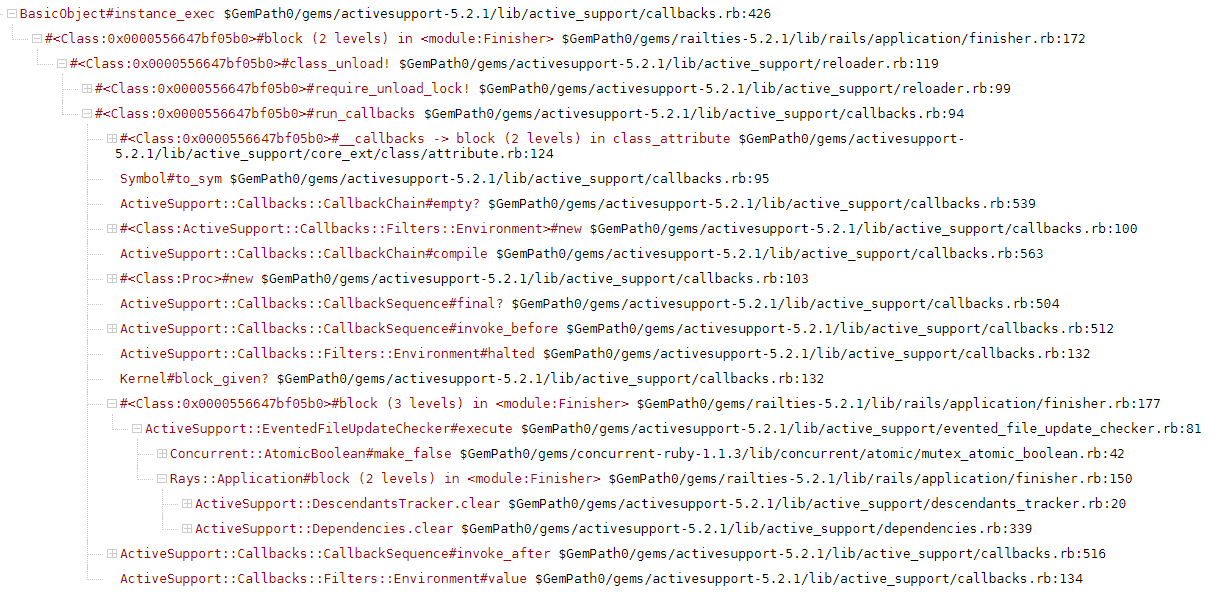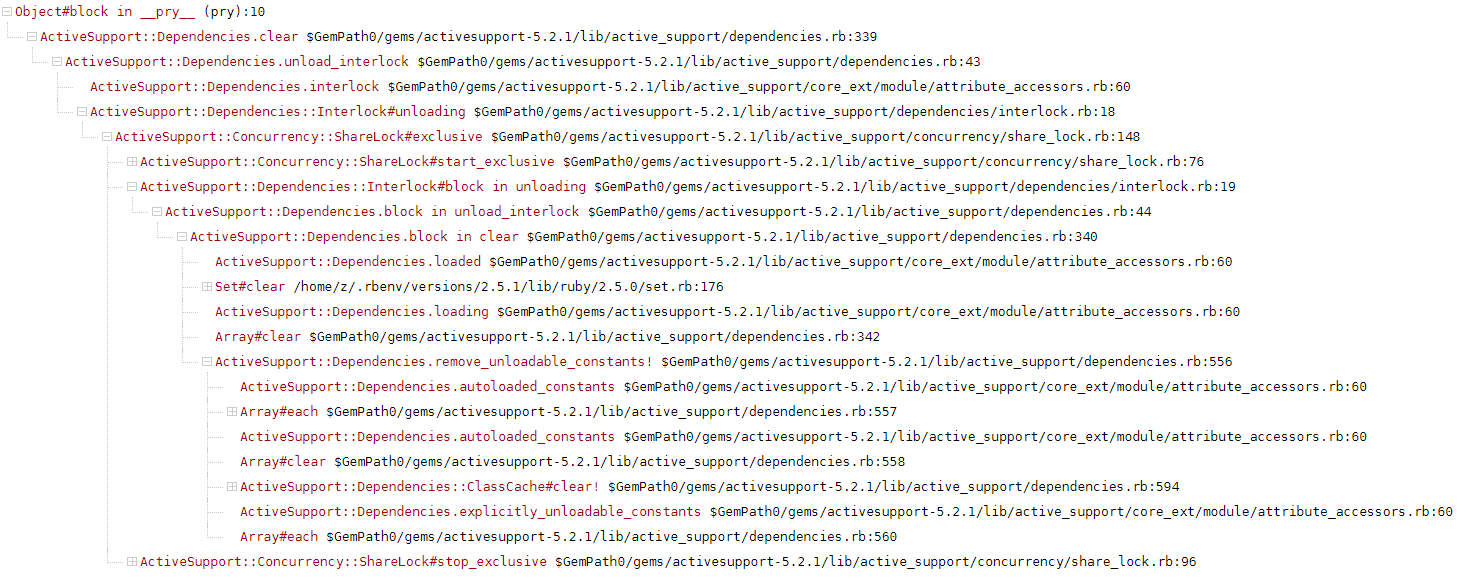rails的reload机制
根据rails guide里constant reloading一节的描述,如果修改了某些代码,想在rails console里重新加载,可输入reload!
此命令其实是调用railties-5.2.1/lib/rails/console/app.rb中的Rails.application.reloader.reload!
于是跟踪一下:
[3] pry(main)> binding.trace_tree(htmp: 'rails_reload_bang'){ Rails.application.reloader.reload! }得调用栈如下
从activesupport-5.2.1/lib/active_support/reloader.rb来看,这reloader的实现比较复杂,它在实际执行run!和complete!的前后,还要执行ExecutionWrapper的run!和complete!,而这些run!和complete!其实是callback……所以调用栈来回跳跃,还包含了一大堆callback机制的调用……
# activesupport-5.2.1/lib/active_support/reloader.rb
module ActiveSupport
class Reloader < ExecutionWrapper
def self.reload!
executor.wrap do
new.tap do |instance|
begin
instance.run!
ensure
instance.complete!
end
end
end
prepare!
end
# activesupport-5.2.1/lib/active_support/execution_wrapper.rb
module ActiveSupport
class ExecutionWrapper
include ActiveSupport::Callbacks
def self.wrap
return yield if active?
instance = run!
begin
yield
ensure
instance.complete!
end
end甚至,reloader里根本没包含任何reload的逻辑,只能从该文件里的一些特别的字眼,如class_unload,去dump出的调用栈里搜索,结果还是发现一些蛛丝马迹:

如上,Rails.application.reloader.reload!是会调用class_unload!的,而这个方法会转而调用railties-5.2.1/lib/rails/application/finisher.rb里定义的回调,该回调执行的就是ActiveSupport::DescendantsTracker.clear和ActiveSupport::Dependencies.clear
# railties-5.2.1/lib/rails/application/finisher.rb
module Rails
class Application
module Finisher
include Initializable
initializer :set_clear_dependencies_hook, group: :all do |app|
callback = lambda do
ActiveSupport::DescendantsTracker.clear
ActiveSupport::Dependencies.clear
end
if config.cache_classes
app.reloader.check = lambda { false }
elsif config.reload_classes_only_on_change
app.reloader.check = lambda do
app.reloaders.map(&:updated?).any?
end
else
app.reloader.check = lambda { true }
end
if config.reload_classes_only_on_change
reloader = config.file_watcher.new(*watchable_args, &callback)
reloaders << reloader
# Prepend this callback to have autoloaded constants cleared before
# any other possible reloading, in case they need to autoload fresh
# constants.
app.reloader.to_run(prepend: true) do
# In addition to changes detected by the file watcher, if routes
# or i18n have been updated we also need to clear constants,
# that's why we run #execute rather than #execute_if_updated, this
# callback has to clear autoloaded constants after any update.
class_unload! do
reloader.execute
end
end
else
app.reloader.to_complete do
class_unload!(&callback)
end
end
end其中ActiveSupport::DescendantsTracker.clear用于对include了ActiveSupport::DescendantsTracker的类清理其对子类的跟踪信息
而ActiveSupport::Dependencies.clear代码量就有点大了,于是另外再跟踪一次:
[7] pry(main)> binding.trace_tree(htmp: 'dep_clear'){ ActiveSupport::Dependencies.clear }得调用栈如下
其实基本骨架还是比较清晰的
def clear
Dependencies.unload_interlock do
loaded.clear
loading.clear
remove_unloadable_constants!
end
end运行起来就是这样

这里面loaded和loading保存的都是文件路径,用于记录哪些代码文件已经加载过,而remove_unloadable_constants!则是调用remove_constant清除常量,其实现如下
def remove_constant(const) #:nodoc:
# Normalize ::Foo, ::Object::Foo, Object::Foo, Object::Object::Foo, etc. as Foo.
normalized = const.to_s.sub(/\A::/, "")
normalized.sub!(/\A(Object::)+/, "")
constants = normalized.split("::")
to_remove = constants.pop
# Remove the file path from the loaded list.
file_path = search_for_file(const.underscore)
if file_path
expanded = File.expand_path(file_path)
expanded.sub!(/\.rb\z/, "")
loaded.delete(expanded)
end
if constants.empty?
parent = Object
else
# This method is robust to non-reachable constants.
#
# Non-reachable constants may be passed if some of the parents were
# autoloaded and already removed. It is easier to do a sanity check
# here than require the caller to be clever. We check the parent
# rather than the very const argument because we do not want to
# trigger Kernel#autoloads, see the comment below.
parent_name = constants.join("::")
return unless qualified_const_defined?(parent_name)
parent = constantize(parent_name)
end
# In an autoloaded user.rb like this
#
# autoload :Foo, 'foo'
#
# class User < ActiveRecord::Base
# end
#
# we correctly register "Foo" as being autoloaded. But if the app does
# not use the "Foo" constant we need to be careful not to trigger
# loading "foo.rb" ourselves. While #const_defined? and #const_get? do
# require the file, #autoload? and #remove_const don't.
#
# We are going to remove the constant nonetheless ---which exists as
# far as Ruby is concerned--- because if the user removes the macro
# call from a class or module that were not autoloaded, as in the
# example above with Object, accessing to that constant must err.
unless parent.autoload?(to_remove)
begin
constantized = parent.const_get(to_remove, false)
rescue NameError
# The constant is no longer reachable, just skip it.
return
else
constantized.before_remove_const if constantized.respond_to?(:before_remove_const)
end
end
begin
parent.instance_eval { remove_const to_remove }
rescue NameError
# The constant is no longer reachable, just skip it.
end
end实际上它就是找出一个常量的父级命名空间,然后在其中调用remove_const,并顺便调用before_remove_const(如果有定义的话)
至此,class和module什么的应该都被清掉了,当再次读到常量名字时,就又会走Dependencies里定义的const_missing回调去加载代码,实现reload

